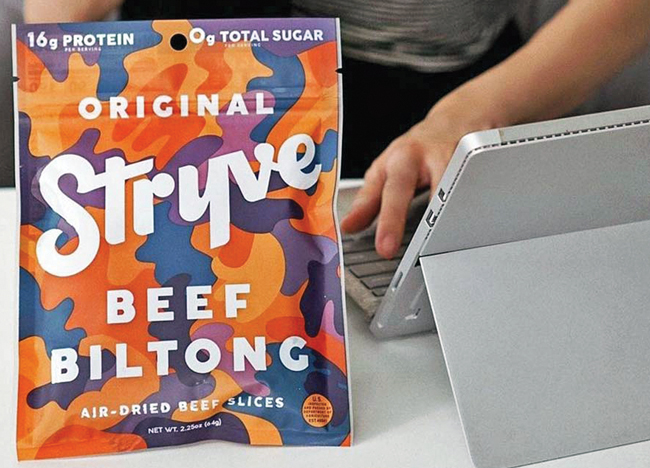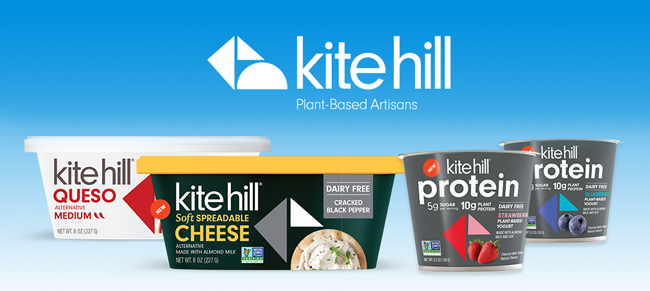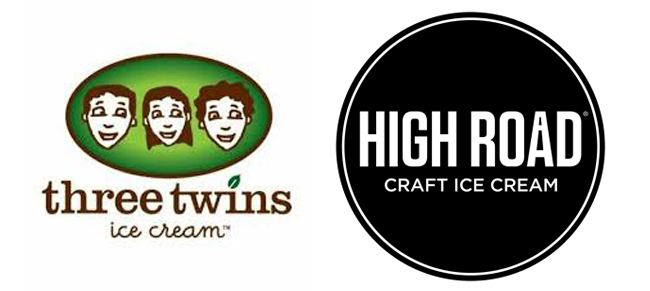NOSHscape: The Latest Food Brand News
SPAC Meets Snacks: Stryve Goes Public, Seeks to Build Snacking Platform
Biltong brand Stryve Foods announced plans to go public on the NASDAQ through a business combination with Andina Acquisition Corp III, a publicly-traded special purpose acquisition company (SPAC). The new company is valued at $170 million, and will be listed on the NASDAQ under the ticker symbol SNAX. Stryve’s goal, the company said, is to become a snacking platform that can exist across categories.
The deal is expected to close by the second quarter of this year. Stryve’s expected net revenue for 2021 is projected to be $46 million, the company said, and claims that profitability is “in reach” by mid-2021. The company expects its 2022 net revenue will hit $92 million.
Strvye had previously raised $26.5 million over two rounds of capital from investors including Meaningful Partners, Pendyne Capital and Murano Group. The company was trying to raise its next round when the Covid-19 pandemic hit, according to Co-CEO and CMO Jaxie Alt. An investor introduced Stryve to Andina, which has had two other SPACs: one with LazyDays R.V. Center in 2017 and another with Colombian glass and window producer Tecnoglass, Inc. in 2013.
“It became very clear to us that a SPAC IPO was really the perfect way for us to get access to the capital we needed in order to really fund our exponential growth plan,” Alt said. “And do it a lot faster than a traditional IPO or acquisition or large investment from private equity.”
Founded in 2013, Stryve produces sliced biltong, a low sugar, high protein alternative to traditional jerky, along with whole biltong slabs and meat sticks under its flagship brand. Stryve is available in 17,000 retailers across the U.S. and Canada. The company has invested not only in building out its brand and product line, but also in its manufacturing capabilities. The company previously acquired the only two USDA certified plants able to produce biltong, and then subsequently shuttered both, retaining some of the plants’ staff and the intellectual property. In 2019, Stryve opened a new 52,000 square foot plant in Madill, Oklahoma, which the company claims is the largest USDA approved facility.
With manufacturing shored up, the goal is to create a platform of air-dried beef options, a subsegment of the jerky category that Alt feels will eventually become the dominant form factor for meat snacks, comparing it to how Chobani has helped Greek yogurt surpass traditional style yogurts. Stryve has already begun to execute toward this goal, acquiring and launching new air dried beef brands.
Acquisitions include the 2018 acquisition of Braaitime, which is sold online only, as well as the December 2020 acquisition of Kalahari Snacks, a brand it previously co-packed for and that has strong traction in the natural channel, Alt said. The brand had 2020 gross revenue of $3.6 million.
Finally, Stryve has also recently launched Vacadillos, a new brand that Alt said is targeting the Hispanic consumer with a Latin American version of biltong called Carne Seca. She noted that there are 60 million Hispanic consumers in the United States, and yet the demographic under indexes for jerky because, she said, “There’s no brand really fulfilling their needs.” Marketing Stryve to Hispanic shoppers, she said, would be ill advised because the name was too unusual and the term biltong simply didn’t resonate. Vacadillos, she added, uses more Latin and Central American flavors such as chili lime.
Kite Hill Launches New Line, Looks to a Future Focused on Consistency
Technology has begun to catch up to plant-based dairy. As alternatives to traditional yogurt, ice cream, and cheese have entered the market en masse, variety has been restricted by manufacturing advances. But plant-based category leader Kite Hill is betting that process improvements will allow it to fully realize the benefits of a slate of new products for 2021.
In December Kite Hill announced new plant-based queso dip, spreadable cheeses and high protein yogurt. Other changes have been made to its Greek yogurt and traditional yogurt offerings. The new products join a robust portfolio of plant-based butters, Greek yogurt, yogurt tubes, ricotta cheese, filled pastas, cream cheese, dips, sour cream, and indulgent dessert-inspired yogurts that are sold in roughly 12,000 stores. It’s a broad product portfolio, but CEO Rob Leibowitz said the company has the power and ability to stretch.
“When I first started [I had] broad aspirations for just a phenomenal business [that had] a broad set of shoulders that had the right to expand into multiple categories,” Leibowitz said. “[But] making great tasting plant-based foods is exponentially harder than making great tasting foods from dairy… I didn’t see that coming until I got here. And thank goodness we attracted the right talent who can get it done.”
The past three years have been spent focusing on talent and production, Leibowitz said. The brand has raised $75 million to date, investing more than $25 million of that money in facilities and processes, including acquiring its copacker in 2018. Though these efforts were “three times harder than expected,” Leibowitz said, they’ve paid off, giving the brand the ability to quickly jump on white space it finds in the marketplace.
Though the company already has four other yogurt products, Leibowitz emphasized that the new higher protein launch will add incremental sales. The goal is to create clearly differentiated use cases for each style. Moving forward, aside from a possible launch of a yogurt package with toppings on the side, the company plans to focus largely on distribution, velocities and repeat consumer purchases for 2021.
Despite the fact that competition is rising in dairy alternatives, Kite Hill will remain focused on giving consumers what they want, which Leibowitz says is simply as close to “a dairy-like taste, texture and color” as possible.
High Road Acquires Three Twins Brand, Will Relaunch as More Premium Offering
Could there be a second life for Three Twins?
In January, High Road ice cream founder Keith Schroeder said his company had acquired the organic ice cream brand’s name and other assets; the brand deal follows a November purchase of the company’s Wisconsin manufacturing plant.
“Sometimes in life opportunities just fall in your lap,” Schoeder said.
The sale price was not disclosed but. Schroeder said it was at a price that didn’t require his team or board to “overthink it.” As part of the deal, High Road has also gained the rights to sub-brands Maxines and Slim Twin, recipes for all flavors and the rights to the name and branding. Although he was initially reticent about acquiring the formerly founder-led brand, Schroeder said he ultimately felt that High Road’s shared values and company culture would allow it to be a good steward of the brand.
Schroeder is particularly interested in the former Maxine’s offering, a premium large-format brick that could be relaunched under the Three Twins brand to avoid fragmentation.
“Three Twins had an avenue to compete against private label organic and the products out of Oregon Ice Cream. And I think it would have been good for both Alden’s and Three Twins to co-exist with different creative approaches to the category,” Schroeder said. “It would have helped the organic set lever up a bit against the Turkey Hill and Breyer’s of the world.”
The deal represents a long time career goal for Schroeder, who originally wanted to launch High Road as an organic ice cream brand. However, like Three Twins CEO and founder Neal Gottlieb also recognized, achieving accessible pricing for small organic brands can be difficult. So High Road pressed forward focused on quality, but not organic specifically. Though he has considered launching an organic product line under the High Road brand, Schroeder felt that the organic shopper wanted a dedicated organic brand.
Schroeder’s thought is to relaunch Three Twins with higher butterfat content than the original product, but charge more than its previous price. He also will focus on launching more unique flavors, rather than analogues to conventional options, and emphasize the benefits to purchasing organic.
“What is available in organic and ice cream seems a lot like what’s available in conventional large format and I think that’s a big mistake,” Schroeder said.
Schroeder and Gottlieb made contact after the deal, speaking about the path forward for the brand. While both told NOSH they are interested in finding ways for Gottlieb to be involved, Gottlieb has since taken on the role of co-founder and CEO of direct-to-consumer paint company Alora Paints and would not be involved on a day-to-day basis.
Snacking Giant Mondelez Acquires Hu Kitchen
Snacking and confection powerhouse Mondelez International recently acquired Hu Master Holdings, the parent company of Hu Products. Terms of the deal were not disclosed but other media outlets have reported the deal valued Hu at roughly $340 million.
Hu senior leadership will also receive a payout based on future performance of the company.
In 2019 Mondelez took a minority stake in the company, which included a right of first refusal to acquire the company in an eventual sale. Hu will operate as a separate business, continuing to produce all products at current manufacturing facilities.
Hu was founded in 2012 as a quick service restaurant and cafe by investment manager Jason Karp and his wife, Jessica Karp, and her brother, Jordan Brown. The New York-based company expanded into CPG products in 2017, launching chocolate bars, chocolate covered fruit and nuts and coffee beans. The line of low-sugar, clean-label products attracted industry interest with the company announcing in 2018 a funding round from 43 investors including Sonoma Brands, the venture fund helmed by CPG veteran Jon Sebastiani, as well as Dr. Mark Hyman, author Tim Ferriss and billionaire Nelson Peltz.
Mondelez initial investment was unique because the company invested in both Hu’s line of packaged products as well as the restaurant concept (which has since shuttered, in part, due to the Covid-19 pandemic). At the time of Mondeléz’s initial investment, Karp told NOSH that Hu would benefit from the company’s understanding of its two core lines of business. Mondelez also owns one of the largest organic chocolate brands with Green & Black as well as several of the leading cracker brands in Ritz, Triscuit and Wheat Thins.
The deal will also help Mondelez expand further into better-for-you and clean label items — the company has previously acquired Enjoy Life, Tate’s Bake Shop, and Perfect Snacks. The goal, executives have said, is to build out a portfolio of brands that can exist across channels and help the company expand deeper into digital.


Receive your free magazine!
Join thousands of other food and beverage professionals who utilize BevNET Magazine to stay up-to-date on current trends and news within the food and beverage world.
Receive your free copy of the magazine 6x per year in digital or print and utilize insights on consumer behavior, brand growth, category volume, and trend forecasting.
Subscribe


